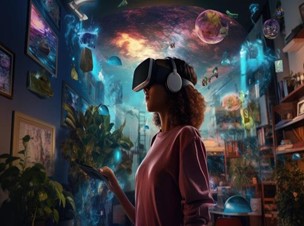The Future of Digital Interaction – Dive into world of the Metaverse

In recent years, the term “metaverse” has captured the imagination of tech enthusiasts, visionaries, and futurists alike. What is the metaverse exactly, and why it is generating so much buzz in the tech world? Let’s delve into this fascinating topic and explore the development of the metaverse, its potential impact on various industries, and what the future might hold.
Understanding the Metaverse
The metaverse can be described as a collective virtual shared space that encompasses a combination of augmented reality (AR), virtual reality (VR), and the internet. It goes beyond traditional online platforms by creating immersive digital environments where users can interact with each other and digital objects in real-time.
Imagine stepping into a virtual world where you can socialize with friends, attend concerts, explore exotic locations, shop for virtual goods, and even conduct business meetings—all from the comfort of your own home. This is the vision of the metaverse—a seamless blend of physical and digital realities that revolutionizes how we connect, create, and experience content.
Metaverse Development: Building the Future
The development of the metaverse is a collaborative effort involving tech companies, developers, content creators, and innovators from various fields. Key elements driving metaverse development include:
- Virtual Worlds and Environments: Metaverse platforms are creating diverse virtual worlds with rich landscapes, realistic physics, and interactive elements.
- Avatar and Identity Systems: In the metaverse, users can create personalized avatars to represent themselves in virtual spaces. Advanced identity systems enable customization, expression, and seamless transitions between different virtual experiences.
- Social Interactions and Communities: Socialization is a core aspect of the metaverse, with platforms facilitating real-time communication, collaboration, and social activities such as parties, events, and group adventures.
- Economy and Virtual Assets: The metaverse economy revolves around virtual goods, assets, and currencies that have real-world value. Players can buy, sell, trade, and earn virtual assets through gameplay, creativity, and participation in the metaverse ecosystem.
- Cross-Platform Integration: Interoperability is key to the metaverse’s success, allowing users to access and interact with virtual environments across different devices, platforms, and technologies seamlessly.
Potential Impact and Applications
The following industries could be disrupted and transformed by the metaverse:
- Entertainment: Virtual concerts, immersive storytelling, and interactive gaming experiences redefine entertainment possibilities.
- Education: Virtual classrooms, simulations, and interactive learning environments enhance education accessibility and engagement.
- Commerce: Virtual shopping, e-commerce integration, and digital marketplaces create new avenues for retail and consumer experiences.
- Work and Collaboration: Remote workspaces, virtual offices, and collaborative tools revolutionize how teams collaborate and communicate globally.
The Future of Digital Interaction
As metaverse development accelerates, we can expect to see:
- Technological Advancements: Advancements in AR, VR, artificial intelligence (AI), and blockchain technologies will drive metaverse innovation.
- Regulatory Considerations: Discussions around privacy, security, digital rights, and governance frameworks will shape the metaverse’s ethical and legal landscape.
- Cultural and Social Shifts: The metaverse will influence cultural norms, social interactions, and digital lifestyles, sparking debates and explorations of virtual identities and communities.
Web References –
https://about.meta.com/us/metaverse/
Dr. Mayuri AVR
Assistant Director,
Digital Outreach.


